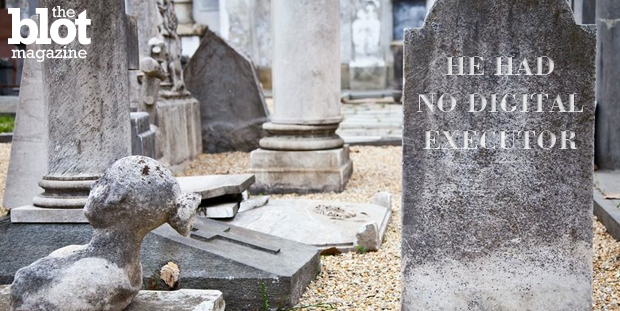
So, you’re dead. You are either off in heaven, wearing a white robe, singing hymns to God the Father Almighty, Maker of Heaven and Earth for all eternity (which sounds like North Korea to me) — or you’re swimming laps in a lake of fire forever and ever.
Your loved ones have a cry, and then move on. Your estate gets settled, and if you had a will, there’s a chance things will be settled as you wanted them settled. But I bet you haven’t appointed a digital executor, someone to manage your digital assets when you are feasting in Valhalla and awaiting Ragnarok.
Well, the truth is that you probably need one. A few years ago, McAfee released a survey it did “revealing that consumers place an average value of $37,438 on the ‘digital assets’ they own across multiple digital devices, yet more than a third lack protection across all of those devices. In the U.S., people valued their assets at a higher figure than anywhere else, at nearly $55,000.” By digital assets, the guys and gals at McAfee mean your Instagram photos, your Gmail messages, content on social media accounts and music/video collections.
Read more: Lonely Death Cleaning Is Booming Business in Japan
A bill working its way through the Florida state legislature would help you protect those assets by letting you appoint a digital executor to protect not only your online banking account but posts and pictures on social media and make sure no one takes advantage of the fact that you’re dead to profit from them.
State Sen. Dorothy Hukill, a Port Orange Republican, is sponsoring SB 102 that covers protecting your “electronic communications and records such as emails, text messages, online photographs, documents stored on the cloud, electronic bank statements, and other electronic communications or records.”
To pick on just one social media company, Facebook recently introduced a “Legacy Contact” feature. You can appoint a Facebook friend to look after things when you are terminally unable to get to your terminal. The person can “write a pinned post … to share a final message on your behalf or provide information about a memorial service.” That person can also respond to new friend requests and update your page. At the same time, that person may not “remove or change past posts, photos and other things shared on your Timeline, read messages you’ve sent to other friends, or remove any of your friends.”
So why is Hukill’s bill necessary if Facebook is going to help you take care of things? “They’re still in control; they decided what those options are — not you,” Sen. Hukill has explained. “They can change it at will. And it requires the other person to be on Facebook. Under my bill, you’re in charge.”
Read more: Green to the Grave: Environmentally Friendly Funerals
Jim Halpert, not the one that’s the character from NBC’s “The Office” but the one that’s general counsel of the State Privacy and Security Coalition to which Facebook, Amazon, Comcast and Google all happen to belong, has argued in the media that “The question is whether the bill goes a little too far.” Hukill’s bill could conflict with federal laws. “State law can’t change that (and) maneuvers to get around federal law are not appropriate.”
It seems to me that Hukill’s bill is vital. When I die, I am not going to let Jamie Dimon, CEO of JPMorgan Chase, decide what to do with my checking account, and I’ll be damned if Mark Zuckerberg will get his sticky mitts on my Facebook account either.
Jeff Myhre is a contributing journalist for TheBlot Magazine.





